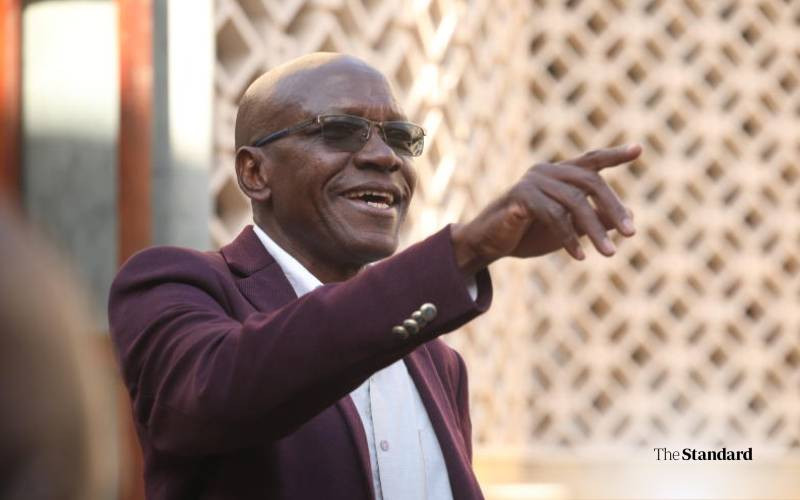Dehorned 'bullfighter' and his trampled Bill

[Elvis Ogina, Standard]
When Boni Khalwale led the chorus ‘Kimunya must go’ inside Parliament in 2008, it marked a rare moment of glory in the fight against corruption.
That was when Kibaki-era Finance chief Amos Kimunya was under fire to resign over the questionable sale of the Grand Regency Hotel (now Laico). Mr Kimunya preferred to ‘die rather than resign,’ but the pressure was too much to bear. In the end, he quit in a huff, and the public celebrated. Even my folks at home in Kaguria popped the champagne.
Since then, Dr Khalwale’s clout has surged like a river after a storm, his small stature notwithstanding. The ‘bullfighter’ is now unstoppable. The other day, he demanded the sacking of none other than powerful Interior Cabinet Secretary Kipchumba Murkomen.
Last month, he ridiculed President William Ruto over ‘empty’ promises to the Mulembe Nation, saying he won’t be quiet ‘like Mr Musalia Mudavadi and Mr Moses Wetang’ula.' The ‘bullfighter’ often mocks the broad-based Cabinet, and tauntingly asks why UDA lacks offices in his region.
In Kakamega County, where the proud polygamist champions the so-called Luhya unity, he mercilessly gores opponents. You’d think it’s bullfighting, his favourite sport. Playwright Cleophas Malala and Governor Ferdinand Barasa will agree that the man from Mulinya is a political daredevil.
But the recent shock withdrawal of a key Bill on transport reforms is a curious retreat for the abrasive Senate Chief Whip. On May 1, he withdrew his Public Transport (Motorcycle Regulation) Bill No. 38 of 2023 despite Senators passing it and forwarding it to the National Assembly.
The Bill aimed at, among others, regulating the boda boda industry through mandatory rider registration, standardisation of safety guidelines by counties, and enforcement of strict licensing regimes. Dr Khalwale cited the need to allow the public ‘more time’ to give views.
Stakeholders had seen the Bill as a new opportunity to restore order on our roads. Its provisions, they say, were long overdue. The current regulatory vacuum has emboldened rogue operators and undermined safety. Honestly, who in their right mind would frustrate such a progressive Bill?
Wanjiku is asking: Who has arm-twisted Dr Khalwale? Why isn’t he saying cartels must go, like he said of Kimunya? Why is he hiding behind public views to forestall the Bill? Even if public participation was done for two years, do we expect unanimity on all aspects of the proposed law? If the Bill dies, who benefits?
While public participation is important when crafting laws, it must be balanced against the urgency to protect lives from avoidable road carnage. Regrettably, the boda boda sector has become synonymous with injuries, deaths and insecurity. For how long will this continue?
Though Dr Khalwale won’t admit it, the Bill is a collateral damage in the ugly fights between the State and entrenched cartels. But let’s be clear, the crisis extends beyond boda boda, with faulty vehicles, reckless drivers, speed limit violations and corrupt police all at play.
Despite existing laws and enforcement agencies like the National Transport and Safety Authority (NTSA), police, and the Judiciary, lapses in public transport have reduced Kenya’s competitiveness compared to Ethiopia and Rwanda. The problem is entrenched corruption.
Decades after late Transport minister John Michuki’s reforms popular as Michuki rules, nothing much has changed. The back-peddling continues. Today, it is normal seeing rogue traffic officers taking bribes from matatu and boda boda operators, even on major highways.
We need a public transport code of conduct to establish clear operational and behavioural standards for operators, saccos, and all stakeholders. But these reforms require courage and political will. Dr Khalwale and like-minded leaders must ensure cartels go at all costs.
Stay informed. Subscribe to our newsletter
But citizens too must join the fight. Their outrage must drown out the sound of bribes exchanging hands. Although the Bill has been gored by bullish cartels, it should ignite a national conversation on the lapses killing us on our roads. NTSA says accidents claim 3,000 lives annually, costing Kenya three to five per cent of its GDP. This is unsustainable. We need leadership from the ‘bullfighter’ and other legislators.









